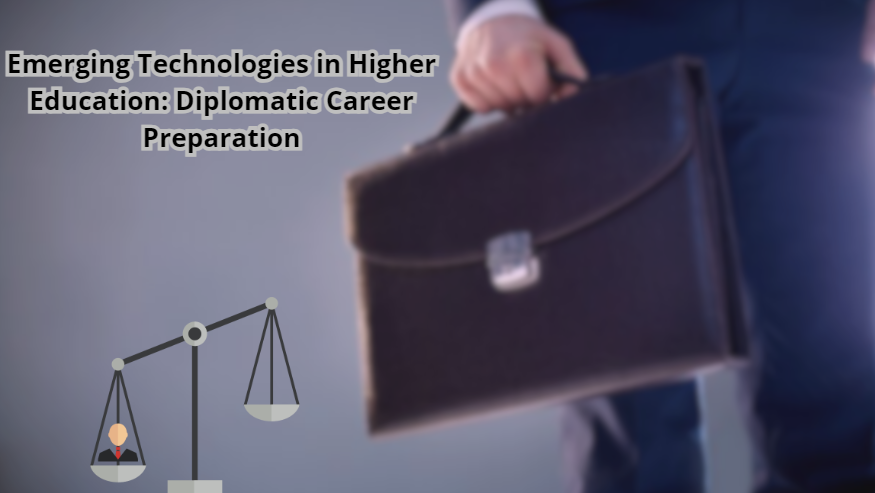The landscape of higher education is rapidly evolving, driven by the relentless pace of technological advancement. Today’s students, especially those aspiring for a career in diplomacy, must be adept at navigating this ever-changing terrain.
Platforms such as EssayPro and Studybay are becoming increasingly relevant. Is Studybay legit? Real user reviews show that it is not only legit but also reliable for academic assistance. It is not a scam, according to any Studybay review. Numerous students turn to such platforms for additional support in their studies. These platforms provide an invaluable resource for students seeking to complement their educational journey, especially when venturing into complex fields such as diplomatic studies. The integration of technology in education, as highlighted by positive Studybay reviews, demonstrates its growing importance in preparing students for their future careers.
This blog post delves into the emerging technologies transforming higher education and how they prepare students for a successful career in diplomacy.
The Role of Technology in Modern Diplomacy
In the 21st century, diplomacy extends beyond traditional negotiation and statecraft. It now encompasses a broader spectrum of activities influenced by technology, including digital communication, data analysis, and cybersecurity. Consequently, higher education institutions must integrate these technologies to prepare future diplomats.
Key Technologies Transforming Diplomacy
- Digital Communication Tools: From social media to secure messaging apps, digital communication is vital in modern diplomacy.
- Data Analytics: Understanding and interpreting large datasets is crucial for policy-making and international relations.
- Cybersecurity: Protecting sensitive information is paramount in the diplomatic sphere.
Integrating Emerging Technologies in Diplomatic Studies
Higher education institutions are uniquely positioned to blend traditional diplomatic training with cutting-edge technological skills.
Innovative Approaches:
- Virtual Reality (VR) Simulations: VR can simulate complex diplomatic scenarios, allowing students to practice negotiations and conflict resolution in a realistic setting.
- Online Collaboration Platforms: These tools facilitate global interaction, mirroring the cross-cultural communication essential in diplomacy.
- AI-Driven Research Tools: Artificial intelligence can aid in analyzing global trends and policy impacts, a key skill for diplomats.
- Case Studies: Universities Leading the Charge
Several universities globally are pioneering the integration of technology in diplomatic studies.
Notable Examples:
- Harvard University: Offers simulations and digital negotiation platforms in its diplomacy courses.
- Oxford University: Incorporates data analysis and cybersecurity training in its international relations program.
- Stanford University: Leverages AI and machine learning for policy research in its diplomacy curriculum.
The Impact on Students: Skills and Competencies
Students immersed in technology-enhanced learning environments gain a competitive edge in the diplomatic field.
Key Skills Developed:
- Digital Literacy: Proficiency in using and understanding digital tools and platforms.
- Analytical Thinking: Enhanced ability to analyze and interpret complex data sets.
- Cultural Awareness: Through virtual exchanges and collaborations, students gain deeper insights into different cultures.
- Curriculum Development: Balancing Technology and Traditional Diplomacy
Curriculum designers face the challenge of integrating technology while preserving the core tenets of diplomatic education.
Strategies for Effective Integration
1. Interdisciplinary Approach
Fostering a comprehensive understanding of diplomacy entails breaking down traditional academic silos.
An interdisciplinary approach, merging disciplines such as political science, international relations, and technology courses, not only broadens students’ knowledge base but also equips them with a holistic perspective. The synthesis of political acumen with technological proficiency becomes a powerful tool for navigating the complexities of modern diplomacy.
2. Practical Workshops
The theoretical understanding gained in classrooms gains practical relevance through hands-on training with the very tools and platforms utilized in diplomatic endeavors. Practical workshops immerse students in the digital landscape, providing them with the skills and confidence to navigate the nuances of digital communication tools, data analytics, and cybersecurity.
This experiential learning approach ensures that students are not only familiar with the theoretical aspects but are adept at applying their knowledge in real-world scenarios.
3. Guest Lectures from Industry Experts
Bringing the real world into the classroom is imperative for preparing students for the intricacies of a diplomatic career. Guest lectures from industry experts, including diplomats and technology specialists, offer invaluable insights into the practicalities of diplomatic engagement in the digital age.
These experts share firsthand experiences, current trends, and the application of emerging technologies in diplomatic contexts. The fusion of academic theory with real-world perspectives enhances students’ understanding and prepares them for the dynamic and rapidly evolving nature of international relations.
Challenges and Opportunities
While technology offers immense potential, it also presents challenges in higher education.
Potential Roadblocks:
- Access to Resources: Ensuring all students have equal access to technological tools and training.
- Keeping Pace with Change: Continuously updating the curriculum to reflect the latest technological advancements.
Opportunities:
- Innovative Learning Models: Using technology to create more engaging and effective learning experiences.
- Global Collaboration: Technology facilitates connections with institutions and experts worldwide, enriching the learning process.
Comparison of Traditional vs. Technology-Enhanced Diplomatic Education
| Aspect | Traditional Diplomatic Education | Technology-Enhanced Diplomatic Education |
| Focus | Classical diplomacy, negotiation, statecraft | Digital communication, data analysis, cybersecurity |
| Skills | Negotiation, language proficiency, cultural understanding | Digital literacy, analytical thinking, tech-savviness |
| Learning Methods | Lectures, case studies, internships | VR simulations, online platforms, AI-driven research |
| Global Perspective | Based on historical and contemporary case studies | Real-time global engagement and data analysis |
| Career Preparedness | Traditional diplomatic roles | Diverse roles including digital diplomacy, policy analysis |
Emerging technologies offer a transformative potential in higher education, particularly in preparing students for careers in diplomacy. By blending traditional methods with innovative tech-based approaches, universities can create a dynamic and relevant educational experience that equips the next generation of diplomats with the necessary tools to navigate the complexities of the modern world.
The Future of Diplomatic Education
The confluence of technology and diplomacy has propelled the realm of higher education into an exhilarating frontier, one where emerging trends redefine the landscape and shape the diplomats of tomorrow. As we gaze into the future of diplomatic education, several key trends stand out, reflecting the evolving nature of international relations in the digital age.
1. Increased Use of AI
Artificial Intelligence (AI) is poised to play a transformative role in diplomatic education, particularly in the realm of predictive analysis within international relations. The integration of AI enables students to harness powerful analytical tools for forecasting geopolitical trends, understanding global dynamics, and making informed policy decisions.
2. Blockchain in Diplomacy
Future diplomatic education is likely to incorporate blockchain for secure communication and the verification of documents. This innovative application ensures the integrity and authenticity of diplomatic communications, providing a robust framework for maintaining trust and confidentiality in an era where secure information exchange is paramount.
3. Virtual Exchange Programs
Virtual exchange programs offer a dynamic platform for cross-cultural learning, transcending geographical boundaries. This innovative approach fosters a global mindset, preparing future diplomats to navigate the complexities of international relations with cultural sensitivity and adaptability.
Conclusion: Embracing the Tech-Driven Diplomatic Era
Higher education institutions play a pivotal role in shaping the diplomats of the future. By embracing and integrating emerging technologies, they can equip students with the skills necessary to excel in a tech-driven diplomatic landscape.

